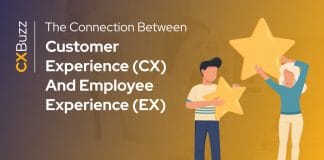What customers want, customers get. And if they don’t get it from you, they’ll get it from someone else.
So, you’re probably devoting a lot of time and energy on customer experience initiatives—most companies are. After all, if you’re not providing a seamless, intuitive process free of hassles and delays, it doesn’t matter how wonderful your product or service is—because potential customers will get frustrated and walk away mid-process and find someone who makes it easy.
In a post-pandemic world, customers rely more than ever on digital channels for doing business. Therefore, there’s more pressure than ever on organizations to meet these expectations and perform in the midst of labor shortages and supply chain issues. As business leaders navigate this new reality, we encourage them to take a more expansive definition of what a customer is so as to avoid unknowingly self-sabotaging themselves.
When you take a step back and ask, “Who are our customers?” you’ll realize there’s an all-important but often overlooked customer group, one that’s actually essential to your success—your supplier base. Your suppliers deliver goods and services in exchange for payment. They are most certainly your “customers.” More importantly, without them, you won’t have anything to offer the more traditional customers you’ve been focused on.
So how can you ensure you don’t bite the hand that feeds you? Digital transformation initiatives should encompass improving these relationships with suppliers—to ensure continued happiness, growth and a steady flow of goods and services.
For your suppliers, their experience is tightly connected to your accounts payable (AP) processes. If you’re not automating AP workflows, you’re overlooking this critical customer group and handicapping your organization in the process.
Don’t Shoot Yourself in the Foot with Manual AP Workflows
Organizations that fail to see their supplier base as a critical customer group tend to have AP departments that are heavily dependent on manual, paper-based processes. Invoice processing, approvals and exceptions are slow, and AP staff spend valuable time on paperwork—time better spent focused on the supplier relationship. In short, manual AP processes are slow, inefficient and error-prone, resulting in:
- Supply chain issues
- A higher cost of goods and services
- Inability to efficiently deliver product to customers
- Reputational harm
- Strained relationships with your supplier base
If your suppliers were to give you a review, manual AP workflows will get you two stars at best. It’s counterintuitive to the broader customer experience strategy just about every company is laser-focused on. A bad experience can have a domino effect that prevents you from meeting your larger revenue and performance objectives.
Fortunately, leading companies have caught on to the opportunity to do better when it comes to the supplier customer experience. The numbers say it all, with 60 percent of organizations now fully or partially automated, according to a recent AP Automation Maturity survey from SSON. Additionally, it looks like even more will be joining the ranks, as another global study, Kofax’s 2022 Intelligent Automation Benchmark Study, discovered that 85 percent of organizations are focused on automating AP processes.
These forward-looking companies get it. They’re adopting AP automation to improve the entire workflow, including how suppliers are managed and paid and every interaction in between. Executives expect the investment in digital transformation to have a big payoff when it comes to the customer experience. Specifically, the Kofax study found executives expect it to:
- Improve customer engagement across channels (93%)
- Optimize customer acquisition/retention (94%)
- Gain customer insights through data (77%)
- Improve customer satisfaction (74%)
- Attract new customers (92%)
- Retain existing customers (90%)
Help Yourself with AP Automation
Enterprises need to get out of their own way and leverage AP automation if they want to delight their supplier customers with the frictionless experience of their dreams. The bottom line is suppliers are paid faster, which keeps them happy (and helps your bottom line).
Modern AP automation platforms also come equipped with advanced analytics, so AP teams can identify your organization’s top suppliers. Staff can focus on creating and maintaining a strong and healthy relationship with the suppliers who are most important to your business. Analytics can also identify bottlenecks in the workflow with certain suppliers, so the process can be improved. As an added bonus to creating a stellar supplier experience, AP automation pays your business back in other ways, including faster invoice processing times with less errors, better cash flow management and improved AP employee productivity.
The business landscape is tough enough these days. Don’t make things even harder for yourself by overlooking your suppliers as a key customer base. Put an end to the self-sabotage and show yourself (and your suppliers) some love with AP automation.






